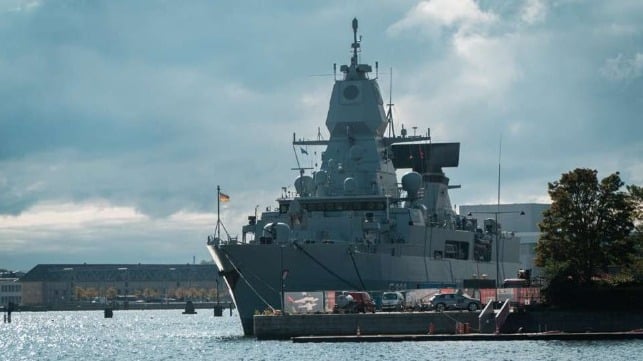NATO Moves Frigate to Copenhagen to Counter Mysterious Drone Threat

The German Navy has deployed a frigate to Copenhagen to contribute to regional air defense during a European Union summit on funding for Ukraine. Denmark's armed forces have reported concerning levels of drone activity over military bases and critical infrastructure since September 22, when a small swarm of drones buzzed Copenhagen's main airport and grounded dozens of flights.
The German frigate Hamburg was on patrol in the central Baltic as part of the NATO maritime security operation Baltic Sentry, itself a response to suspicious "gray zone" activity at sea. Last week, the warship diverted from its operating area and headed for Denmark, and she is now berthed at a pier in the Langelinie district of Copenhagen's central harbor, next to the historic Kastellet fortress.
Hamburg is a Sachsen-class air defense frigate, and is equipped to carry SM-2 and Sea Sparrow surface-to-air missiles, plus the short-range Rolling Airframe Missile (RAM) for threats within five miles. The SM-2 loadout gives Hamburg the ability to project an air defense umbrella as far as 90 nautical miles in any direction, limited by the number of missiles in her VLS cells. The main airport is only six nautical miles away to the south, well within range for her complement of Sea Sparrow missiles.
In addition to the redeployment of the Hamburg, the German military is providing Denmark with certain shoreside counter-drone systems (as-yet-unspecified) during the EU meeting.
To ease identification of hostile targets and clear the airspace, the Danish government has ordered a weeklong ban on all civilian drone operations anywhere in Danish airspace from September 29 through October 3. Violators face up to two years in prison or a fine for breaches of the decree. "We cannot accept that foreign drones create uncertainty and disturbances in society, as we have experienced recently. At the same time, Denmark will host EU leaders in the coming week, where we will have extra focus on security," said transport minister Thomas Danielsen in a statement Sunday.
Denmark's military confirmed even more new drone sightings over military bases on Sunday, the day that the decree entered effect. Danish authorities believe the drone raids are directed by a sophisticated and well-resourced operator, and while they have so far declined to name suspects, they have also declined to rule out Russia.
The Russian military is one of the world's most sophisticated operators of drone technology, having honed its capabilities on the battlefront in Ukraine, and has repeatedly violated the eastern outskirts of NATO airspace with apparent probing operations in recent weeks. The EU meeting in Copenhagen this week will have direct bearing on Moscow's interests: it will include a discussion of how to respond to Russian airspace violations, as well as a conversation about how to finance Ukraine's ongoing defense against Russian air and ground operations.

that matters most
Get the latest maritime news delivered to your inbox daily.
There are circumstantial hints of a Russian connection in the Copenhagen raid: the three vessels suspected of serving as drone launchpads during the attack all have ties to Russia, some more than others. According to investigative journalism outfit Danwatch, one of the vessels - the Norwegian-owned Oslo Carrier 3 - has links to Russian paramilitary outfit RSB Group. The operator maintains a division in the Russian Baltic exclave of Kaliningrad, and the director of that division appears to have a close working relationship with RSB's owner, according to Danwatch. RSB is believed to be closely aligned with the Kremlin's military establishment, like other Russian paramilitary groups.
Ukrainian President Volodymyr Zelensky warned Sunday that the Russia-serving "shadow fleet" of under-regulated tankers could serve as a launch pad for malign covert operations in Europe. "This [drone raid in Copenhagen] is further evidence that the Baltic Sea and other seas should be closed to Russian tankers, at least for the shadow fleet," Zelensky said.
